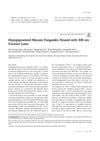Vogt-Koyanagi-Harada Disease Diagnosed in a Black-Skinned Woman in Internal Medicine
June 2023
in “
Scholars journal of medical case reports
”
TLDR A black-skinned woman was diagnosed with Vogt-Koyanagi-Harada disease and treated with steroids and eye drops.
A 45-year-old black-skinned Malian woman with no prior history of ocular issues presented with symptoms including achromic skin patches, visual and hearing disturbances, tinnitus, and headache. Upon examination, she exhibited symmetrical achromic lesions on her skin, scalp poliosis, and perioral pityriasis versicolor without alopecia. Ophthalmological tests revealed bilateral posterior panuveitis, chronic iridocyclitis, and choroidal thickening. Based on the American Society for the Study of Uveitis criteria from 1978, she was diagnosed with Vogt-Koyanagi-Harada disease, a rare occurrence in individuals of African descent. Treatment included prednisone at 1.5 mg/kg with tapering courses, 1% atropine, 0.25% timoptol, and dexamethasone eye drops, which were discontinued due to systemic corticotherapy, and Hydrocortisone butyrate 0.1% cream for dermatological care.



